Chaoyue Zhao
SmartHome-Bench: A Comprehensive Benchmark for Video Anomaly Detection in Smart Homes Using Multi-Modal Large Language Models
Jun 15, 2025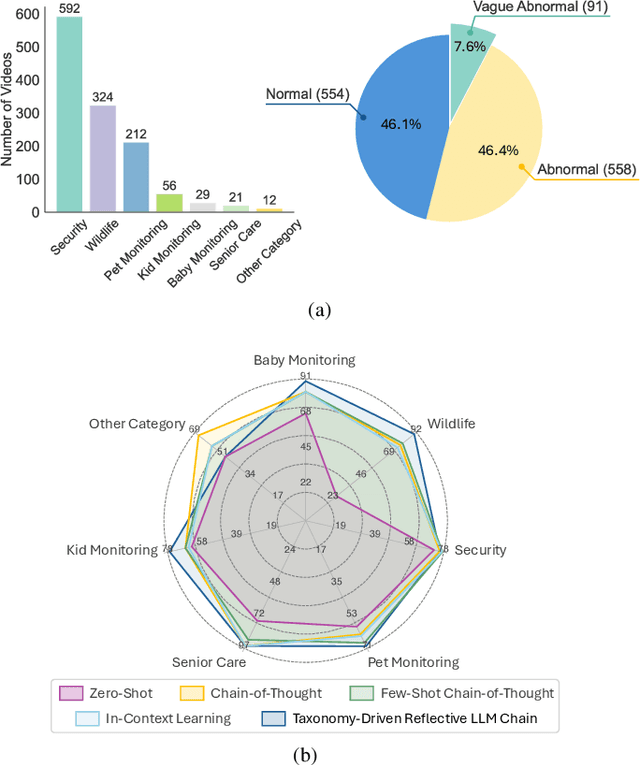
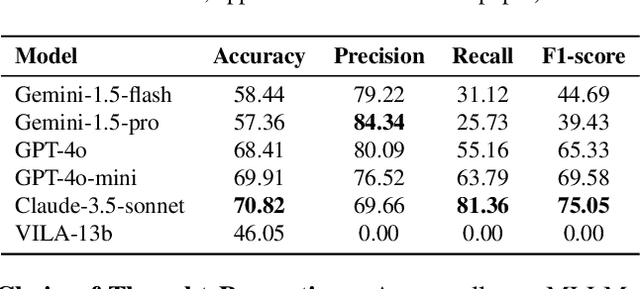
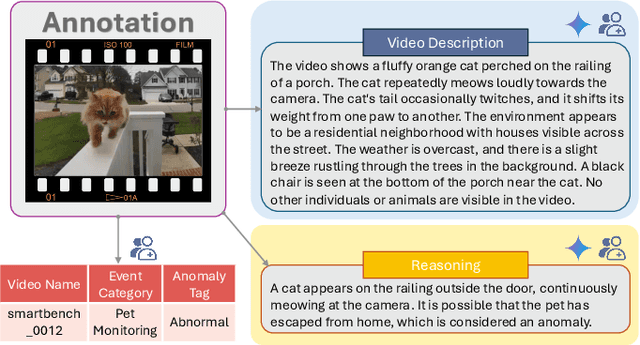
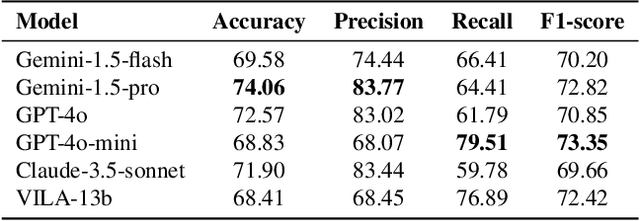
Abstract:Video anomaly detection (VAD) is essential for enhancing safety and security by identifying unusual events across different environments. Existing VAD benchmarks, however, are primarily designed for general-purpose scenarios, neglecting the specific characteristics of smart home applications. To bridge this gap, we introduce SmartHome-Bench, the first comprehensive benchmark specially designed for evaluating VAD in smart home scenarios, focusing on the capabilities of multi-modal large language models (MLLMs). Our newly proposed benchmark consists of 1,203 videos recorded by smart home cameras, organized according to a novel anomaly taxonomy that includes seven categories, such as Wildlife, Senior Care, and Baby Monitoring. Each video is meticulously annotated with anomaly tags, detailed descriptions, and reasoning. We further investigate adaptation methods for MLLMs in VAD, assessing state-of-the-art closed-source and open-source models with various prompting techniques. Results reveal significant limitations in the current models' ability to detect video anomalies accurately. To address these limitations, we introduce the Taxonomy-Driven Reflective LLM Chain (TRLC), a new LLM chaining framework that achieves a notable 11.62% improvement in detection accuracy. The benchmark dataset and code are publicly available at https://github.com/Xinyi-0724/SmartHome-Bench-LLM.
LexPro-1.0 Technical Report
Mar 11, 2025Abstract:In this report, we introduce our first-generation reasoning model, LexPro-1.0, a large language model designed for the highly specialized Chinese legal domain, offering comprehensive capabilities to meet diverse realistic needs. Existing legal LLMs face two primary challenges. Firstly, their design and evaluation are predominantly driven by computer science perspectives, leading to insufficient incorporation of legal expertise and logic, which is crucial for high-precision legal applications, such as handling complex prosecutorial tasks. Secondly, these models often underperform due to a lack of comprehensive training data from the legal domain, limiting their ability to effectively address real-world legal scenarios. To address this, we first compile millions of legal documents covering over 20 types of crimes from 31 provinces in China for model training. From the extensive dataset, we further select high-quality for supervised fine-tuning, ensuring enhanced relevance and precision. The model further undergoes large-scale reinforcement learning without additional supervision, emphasizing the enhancement of its reasoning capabilities and explainability. To validate its effectiveness in complex legal applications, we also conduct human evaluations with legal experts. We develop fine-tuned models based on DeepSeek-R1-Distilled versions, available in three dense configurations: 14B, 32B, and 70B.
Provably Convergent Policy Optimization via Metric-aware Trust Region Methods
Jun 25, 2023



Abstract:Trust-region methods based on Kullback-Leibler divergence are pervasively used to stabilize policy optimization in reinforcement learning. In this paper, we exploit more flexible metrics and examine two natural extensions of policy optimization with Wasserstein and Sinkhorn trust regions, namely Wasserstein policy optimization (WPO) and Sinkhorn policy optimization (SPO). Instead of restricting the policy to a parametric distribution class, we directly optimize the policy distribution and derive their closed-form policy updates based on the Lagrangian duality. Theoretically, we show that WPO guarantees a monotonic performance improvement, and SPO provably converges to WPO as the entropic regularizer diminishes. Moreover, we prove that with a decaying Lagrangian multiplier to the trust region constraint, both methods converge to global optimality. Experiments across tabular domains, robotic locomotion, and continuous control tasks further demonstrate the performance improvement of both approaches, more robustness of WPO to sample insufficiency, and faster convergence of SPO, over state-of-art policy gradient methods.
Towards Optimal Pricing of Demand Response -- A Nonparametric Constrained Policy Optimization Approach
Jun 24, 2023



Abstract:Demand response (DR) has been demonstrated to be an effective method for reducing peak load and mitigating uncertainties on both the supply and demand sides of the electricity market. One critical question for DR research is how to appropriately adjust electricity prices in order to shift electrical load from peak to off-peak hours. In recent years, reinforcement learning (RL) has been used to address the price-based DR problem because it is a model-free technique that does not necessitate the identification of models for end-use customers. However, the majority of RL methods cannot guarantee the stability and optimality of the learned pricing policy, which is undesirable in safety-critical power systems and may result in high customer bills. In this paper, we propose an innovative nonparametric constrained policy optimization approach that improves optimality while ensuring stability of the policy update, by removing the restrictive assumption on policy representation that the majority of the RL literature adopts: the policy must be parameterized or fall into a certain distribution class. We derive a closed-form expression of optimal policy update for each iteration and develop an efficient on-policy actor-critic algorithm to address the proposed constrained policy optimization problem. The experiments on two DR cases show the superior performance of our proposed nonparametric constrained policy optimization method compared with state-of-the-art RL algorithms.
Decision-Dependent Distributionally Robust Markov Decision Process Method in Dynamic Epidemic Control
Jun 24, 2023Abstract:In this paper, we present a Distributionally Robust Markov Decision Process (DRMDP) approach for addressing the dynamic epidemic control problem. The Susceptible-Exposed-Infectious-Recovered (SEIR) model is widely used to represent the stochastic spread of infectious diseases, such as COVID-19. While Markov Decision Processes (MDP) offers a mathematical framework for identifying optimal actions, such as vaccination and transmission-reducing intervention, to combat disease spreading according to the SEIR model. However, uncertainties in these scenarios demand a more robust approach that is less reliant on error-prone assumptions. The primary objective of our study is to introduce a new DRMDP framework that allows for an ambiguous distribution of transition dynamics. Specifically, we consider the worst-case distribution of these transition probabilities within a decision-dependent ambiguity set. To overcome the computational complexities associated with policy determination, we propose an efficient Real-Time Dynamic Programming (RTDP) algorithm that is capable of computing optimal policies based on the reformulated DRMDP model in an accurate, timely, and scalable manner. Comparative analysis against the classic MDP model demonstrates that the DRMDP achieves a lower proportion of infections and susceptibilities at a reduced cost.
Model-Informed Generative Adversarial Network (MI-GAN) for Learning Optimal Power Flow
Jun 04, 2022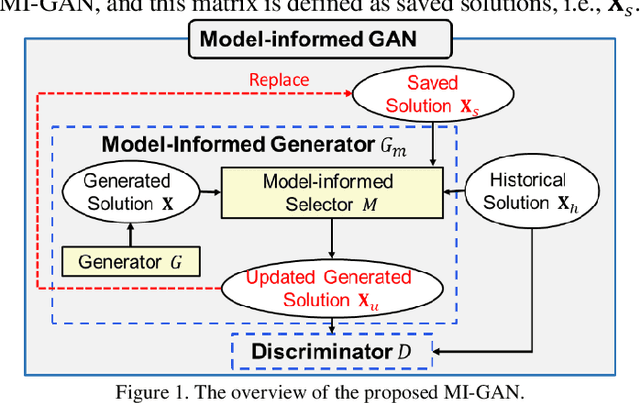


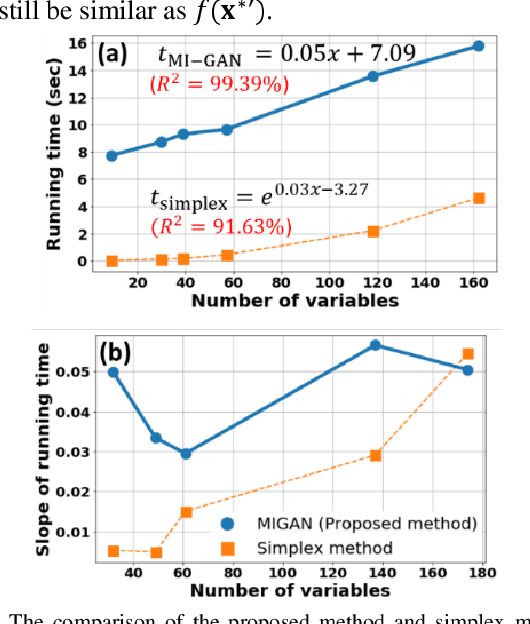
Abstract:The optimal power flow (OPF) problem, as a critical component of power system operations, becomes increasingly difficult to solve due to the variability, intermittency, and unpredictability of renewable energy brought to the power system. Although traditional optimization techniques, such as stochastic and robust optimization approaches, could be used to address the OPF problem in the face of renewable energy uncertainty, their effectiveness in dealing with large-scale problems remains limited. As a result, deep learning techniques, such as neural networks, have recently been developed to improve computational efficiency in solving large-scale OPF problems. However, the feasibility and optimality of the solution may not be guaranteed. In this paper, we propose an optimization model-informed generative adversarial network (MI-GAN) framework to solve OPF under uncertainty. The main contributions are summarized into three aspects: (1) to ensure feasibility and improve optimality of generated solutions, three important layers are proposed: feasibility filter layer, comparison layer, and gradient-guided layer; (2) in the GAN-based framework, an efficient model-informed selector incorporating these three new layers is established; and (3) a new recursive iteration algorithm is also proposed to improve solution optimality. The numerical results on IEEE test systems show that the proposed method is very effective and promising.
Optimistic Distributionally Robust Policy Optimization
Jun 14, 2020



Abstract:Trust Region Policy Optimization (TRPO) and Proximal Policy Optimization (PPO), as the widely employed policy based reinforcement learning (RL) methods, are prone to converge to a sub-optimal solution as they limit the policy representation to a particular parametric distribution class. To address this issue, we develop an innovative Optimistic Distributionally Robust Policy Optimization (ODRPO) algorithm, which effectively utilizes Optimistic Distributionally Robust Optimization (DRO) approach to solve the trust region constrained optimization problem without parameterizing the policies. Our algorithm improves TRPO and PPO with a higher sample efficiency and a better performance of the final policy while attaining the learning stability. Moreover, it achieves a globally optimal policy update that is not promised in the prevailing policy based RL algorithms. Experiments across tabular domains and robotic locomotion tasks demonstrate the effectiveness of our approach.
 Add to Chrome
Add to Chrome Add to Firefox
Add to Firefox Add to Edge
Add to Edge